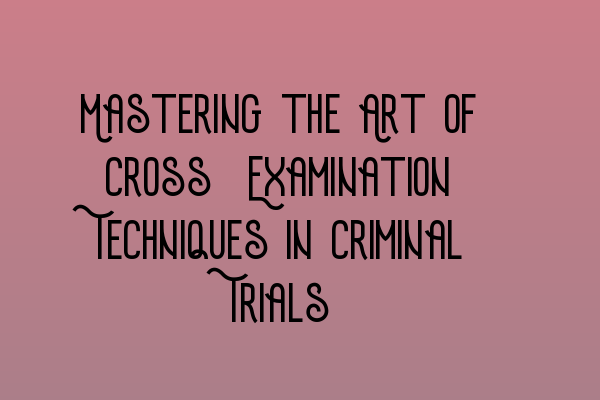Mastering the Art of Cross-Examination Techniques in Criminal Trials
Cross-examination is a vital skill for criminal lawyers, allowing them to challenge the credibility and accuracy of witness testimony. It is an art that requires careful planning, effective communication, and a deep understanding of the law. In this blog post, we will explore the essential techniques that every criminal lawyer should master to conduct a successful cross-examination in a criminal trial.
1. Preparation is Key
Before entering the courtroom, thorough preparation is essential. Familiarize yourself with the facts of the case, the witness statements, and any evidence that will be presented. Anticipate potential areas of weakness or inconsistency in the witness’s testimony and develop a strategy to exploit them. The more prepared you are, the more effective your cross-examination will be.
2. Establish Control and Credibility
From the moment you begin your cross-examination, it is crucial to establish control and credibility. Maintain a calm and composed demeanor, and present yourself as knowledgeable and confident. This will help to build trust with the judge, the jury, and the witness. Remember, your goal is to undermine the witness’s credibility, not to intimidate or offend them.
3. Use Leading Questions
Leading questions are an essential tool in cross-examination. By phrasing questions in a suggestive manner, you can guide the witness towards the answers you want to elicit. Use questions that require a simple “yes” or “no” response, as these are easier to control and convey your desired narrative. Leading questions can help expose inconsistencies in the witness’s testimony and weaken their credibility.
4. Challenge Memory and Perception
Witnesses often have imperfect memories and may misperceive or distort events. Use cross-examination to challenge the witness’s memory and perception by introducing contradictory evidence or highlighting inconsistencies in their statements. By demonstrating that the witness’s testimony is unreliable, you can cast doubt on their credibility and weaken the prosecution’s case.
5. Impeach the Witness
Impeaching a witness involves attacking their credibility and showing inconsistencies in their previous statements, character, or bias. You can accomplish this through thorough questioning and by introducing contradictory evidence. Look for discrepancies between the witness’s statements and their previous statements, police reports, or other evidence. If the witness has a history of dishonesty or bias, use this to discredit their testimony.
6. Use Effective Communication Techniques
Effective communication is vital during cross-examination. Keep your questions short, clear, and concise. Avoid using complex language or technical terms that the jury may not understand. Use visual aids, such as photographs or diagrams, to help illustrate your points and make your questioning more engaging. Remember to maintain eye contact with the witness and the jury, as it enhances your credibility and persuasiveness.
7. Control Emotional Witnesses
Occasionally, you may encounter emotional witnesses who can be difficult to handle during cross-examination. To control emotional witnesses, maintain a calm and empathetic approach. Avoid escalating the emotional atmosphere in the courtroom, as it may negatively impact your case. Instead, focus on asking structured questions that elicit specific and controlled responses. By remaining composed and assertive, you can effectively challenge emotional testimony.
8. Adapt to Changing Circumstances
Cross-examination is a dynamic process, and you must be prepared to adapt to changing circumstances. Pay attention to the witness’s responses and react accordingly. If the witness becomes argumentative or uncooperative, maintain your composure and address the issue with the court. Flexibility and agility are key to ensuring that you can effectively challenge the witness’s testimony and strengthen your case.
In conclusion, mastering the art of cross-examination is crucial for criminal lawyers seeking success in the courtroom. By thoroughly preparing, establishing control and credibility, using leading questions, challenging memory and perception, impeaching the witness, employing effective communication techniques, controlling emotional witnesses, and adapting to changing circumstances, attorneys can effectively challenge the credibility of witness testimony and strengthen their case. Remember, practice makes perfect, so continue honing your cross-examination skills to achieve the best possible outcomes for your clients.
For expert legal advice and representation in criminal matters, contact SQE Criminal Law & Practice Law UK. Our experienced solicitors are well-versed in cross-examination techniques and ready to fight for your rights.
